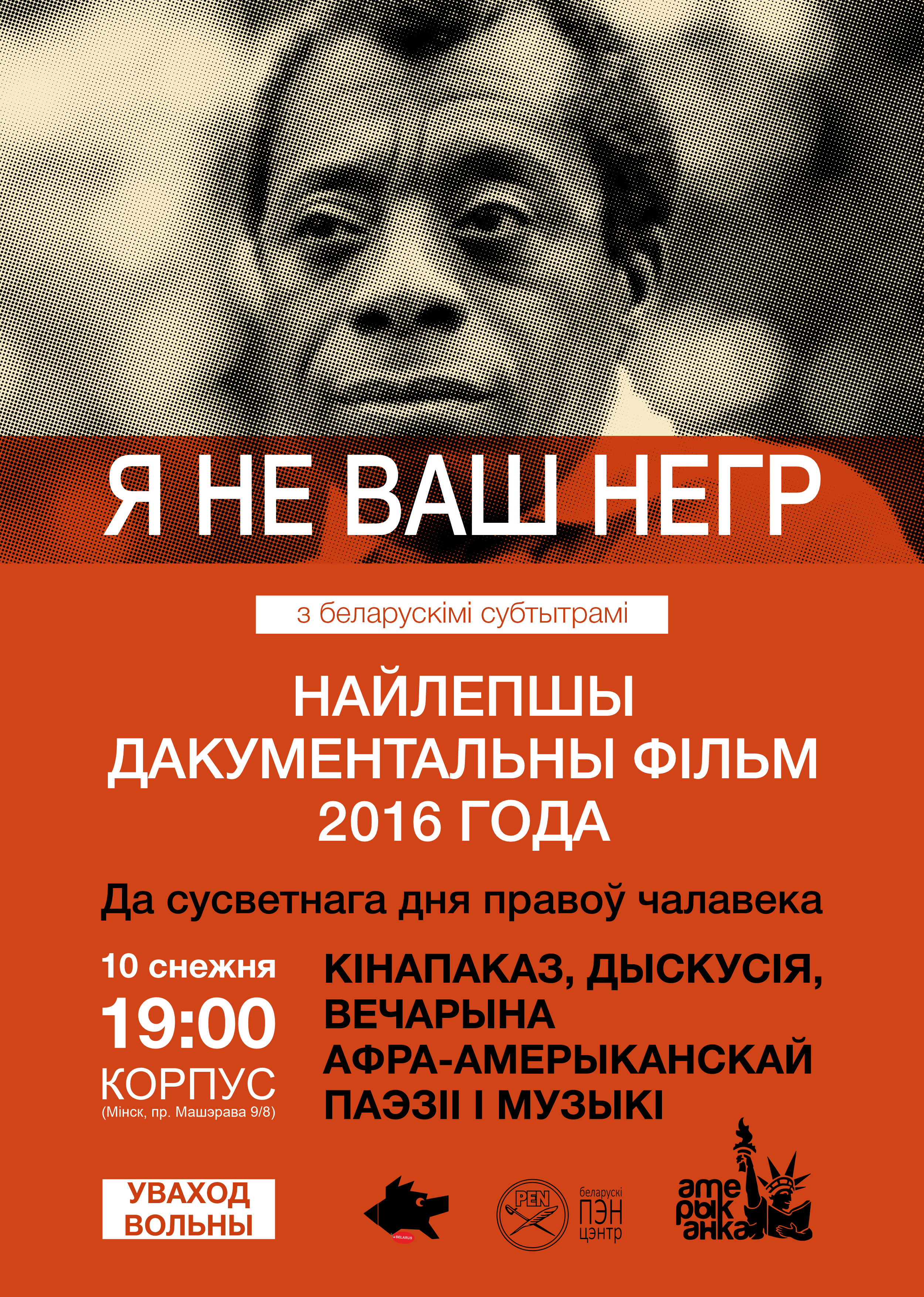
The film will be screened in English with Belarusian subtitles (translation by Paval Kasciukievič). The discussion and poetry&music event will be held after the screening.
Venue: Korpus Culture Center (Mašerava 9/8, Minsk, Belarus)
Timing (FET):
19:00 – 19:00 – 20:35. I Am Not Your Negro screening with Belarusian subtitles (translation by Paval Kasciukievič).
20:40 – 21: 30. Discussion & poetry readings with zoom-participation of poet and film director Ladan Osman (Somali-USA) and poet, translator and publisher Dmitry Kuzmin (Russia-Latvia). Moderated offline by Maryja Martysievič, writer, translator and Amerykanka Book Series editor.
21:30 – 22:00 A set of original American music genres (blues, gospel, spirituals) by showman Jury Uskou.
I Am Not Your Negro is an award-winning documentary film from 2016, which was shot on the basis of the unfinished manuscript of the memoir Remember This House by James Baldwin (1924 – 1987). In his film, Peck attempts to capture the racism of US society in a chronological panorama from 1890 to 2014 by means of cinematic collage and the life story of three friends of Baldwin from the civil rights movement who were murdered in the 1960s: human rights lawyer Medgar Evers (+1963), Black Muslim Malcolm X (+1965) and Baptist pastor and civil rights activist Martin Luther King Jr.
The film illuminates the continuity of racism and documents the resistance against it, which is also articulated in art. The worldwide screening of Raoul Peck’s film is also intended to emphasize our responsibility to process the history of colonization and racism in detail. 400 years after the first slaves were brought ashore in chains in Jamestown, Virginia, the equal treatment of whites and People of Color is by no means established. Over nearly four centuries, an estimated 10-12 million enslaved Africans were transported to the Americas, mainly by European traders. More than 250 years after the abolition of the Atlantic slave trade, the equal treatment of whites and People of Color is by no means established – neither in the Americas nor in Europe nor in other regions on the globe.
James Baldwin (*1924 in Harlem, New York City – 1987+ Saint-Paul-de-Vence, France) was one of the most important writers of the 20th century. Books like The Fire Next Time (1962) deal with racism and sexuality.
Raoul Peck (*1953 in Port-au-Prince, Haiti) is a filmmaker and screenwriter who became internationally known through the documentary (1990) Lumumba: La mort du Prophète (1992) and the feature film Lumumba (2001), among others.
The 7th edition of the WATCH DOCS Belarus Human Rights Film Festival will take place on December 8-13, 2020. As usual, it will feature hand-picked documentaries on the most acute topics from all over the world, including Belarus.
Attention! The WATCH DOCS Film Festival is crowdfunding for the Anti-Award to mark the most awkward and controversial human rights-related accomplishments in Belarus in 2020. The audience is to decide who those prices will go to.
To donate, please click here.
Belarusian PEN was founded in 1989. As a member of PEN International Belarusian PEN Centre has a status A in the UNESCO and consultative status in the UN.
Amerykanka Book Series in an independent publishing project. Since 2017 it brings together books of North American authors writing about freedom and human dignity. Powerful American books are translated into Belarusian in the best way to add new dimensions to Belarusian culture.
